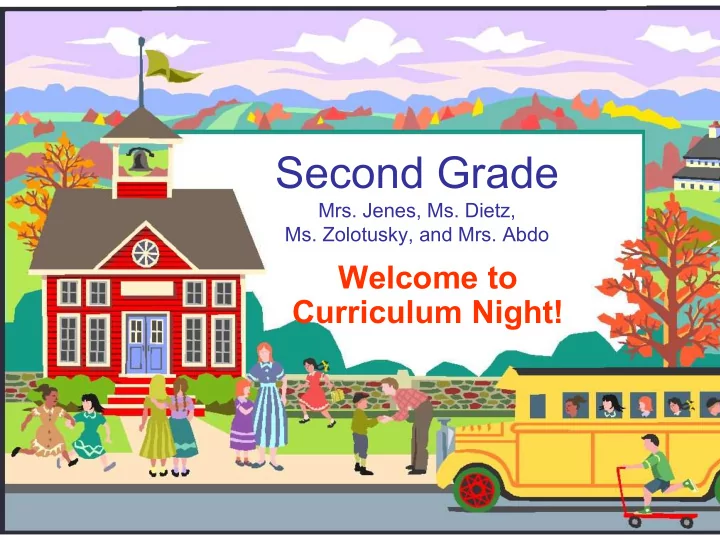

Second Grade Mrs. Jenes, Ms. Dietz, Ms. Zolotusky, and Mrs. Abdo Welcome to Curriculum Night!
About the 2B Teacher Ms. Dietz • Graduated from Lewis & Clark High School • Graduated from University of Washington with a BA in Sociology and a Minor in Elementary, Learning & Societies • Graduated from the College of William & Mary with an MaEd in Elementary Education (K-6th) • Title 1 experience in Washington D.C. • Teaching Endorsements: • English Language Learner License (ELL) • Special Education License (K-12th) • Early Childhood (PreK-2nd) 2
About the 2A Teacher Mrs. Jenes • Graduated from Bishop Blanchet High School • Undergraduate degree in Elementary Education from Carroll College • Masters degree in Education with a focus on Differentiated Instruction • Lower and upper Montessori classroom experience & Title 1 Experience 3
Philosophy and Goals ∙ To educate the whole student: personally, spiritually, and academically. ∙ Differentiated instruction is a component of a socially just education. ∙ To foster a supportive and respectful learning environment and a sense of classroom unity. 4
Classroom Behavior Expectations 1. Be Kind 2. Be Responsible 3. Be Respectful 4. Be Safe 5. Be Welcoming 5
Classroom Management and Discipline ∙ Let others learn and be respectful ∙ Proactive and positive→ Setting up routines and expectations so kids can be successful ∙ Stone/Marble Jar 6
Assumption – St. Bridget Discipline Flow Chart 7
Support Teachers ∙ Mrs. Riggle—school psychologist ∙ Mrs. Dougherty—reading support teacher ∙ Mr. Steve Dougherty – Math Coach 8
Homework ∙ Expect daily homework, with just reading and prayers on the weekends. ∙ Homework should not exceed 45 minutes which includes 15 minutes reading. ∙ Students should be responsible for their homework notebooks/planners—preparation for future grades 9
Absences and Tardiness ∙ Please have your child to school by 8:30. We start learning as soon as the bell rings. ∙ Please review the attendance policy ∙ All absences (except for when your child is sick) must be documented on the pre-planned absence form found on the school website ∙ https://www.asbschool.org/student-life/attendance / 10
Reading with your child ∙ Independent reading level : Out of 100 words, reads at least 97 correctly and fluently. ∙ Instructional reading level : Out of 100 words, reads between 90 and 95 words correctly. Normally a child should read this book with an adult. This level doesn’t build fluency. ∙ Frustration reading level : Out of 100 words, reads less than 90 words correctly and fluently. Normally a child should have this book read aloud or be encouraged to save it for a later date. 11
Visiting ∙ Please join your child during his/her VIP week and on his/her birthday for lunch. ∙ Please say good-bye to your child before 8:30 so he/she is ready to learn when the bell rings. ∙ Visit the office when you arrive at school to pick your child up early or to drop off something. ∙ No unannounced visits, please. They can be disruptive. *You must complete your Called To Protect Training and/or renewal prior to volunteering* 12
Volunteers MUST HAVE VOLUNTEER BACKGROUND CHECK IN THE OFFICE ∙ If you don’t have the current paperwork on file in the office, you will not be able to volunteer in the classroom or on field trips. ∙ https://www.asbschool.org/parents/ volunteering/ 13
Sign-up Genius ∙ Sign up for centers, auction project, classroom parties, etc. 14
Uniform ∙ Dress uniform on Mass days – collared shirt, blue pants or skirts ∙ Please refer to the ASB school website for the full uniform code. ∙ https://www.asbschool.org/wp-content/u ploads/2015/08/ASB-uniform-code-201 6-2017.pdf 15
Communication ∙ The best way to get a hold of us is by email: Mrs. Jenes 2A - ljenes@asbschool.org Ms. Dietz 2B- cdietz@asbschool.org ∙ Please bring up concerns as soon as possible via email. 16
Curriculum ∙ Based on the National Common Core Standards, the Archdiocesan Religion standards, and Next Generation of Science Standards ∙ Emphasis on reading, writing, and math ∙ Differentiated for different abilities and developmental levels and interests 17
Religion ∙ Based on Archdiocesan standards ∙ Prayers ∙ Sacraments: Reconciliation and Eucharist (Contact your parish) ∙ Parts of the Mass ∙ Liturgical Year 18
Reading According to the National Reading Panel (2001), there are five interrelated components to quality reading instruction: All of these areas will be taught: ∙ Phonemic Awareness ∙ Phonics ∙ Comprehension ∙ Fluency ∙ Vocabulary Armbuster, B.B., Lehr, F., and Adler, R.C.(2001). Put Reading First: The Research Building Blocks for Teaching Children to Read in Kindergarten Through Grade 3 . National Reading Panel. 19
Math ∙ All Common Core Standards will be taught and assessed, some examples of these skills include: ∙ problem solving ∙ addition and subtraction with and without regrouping ∙ place value and number sense, and measurement ∙ graphing ∙ time ∙ money 20
Language Arts ∙ Genres: Expository paragraphs, Friendly Letters, How-to paragraphs, Narratives, and simple reports ∙ Grammar: Sentences and parts of speech as a way of enhancing writing ∙ Writing process with guidance: Brainstorming, drafting, revising, editing, publishing 21
Spelling ∙ Focuses on phonograms ∙ Teaches spelling patterns and rules – not lists of words to memorize ∙ Example: /oa/ boat f,l,s,z rule soft c and g ∙ Weekly spelling tests will include most words from the weekly preview list plus additional words that follow the same spelling focus 22
Science ∙ Properties of Matter ∙ Ecosystems and Life Cycles ∙ Processes that Shape the Earth ∙ Engineering Design ∙ Skills include: Sorting and classifying, making observations, predicting, and recording simple data. 23
Social Studies ∙ Civics ∙ Economics ∙ Geography ∙ History ∙ Special Project: Holidays Around the World→ Other ways of looking at community 24
Field Trips ∙ Killer Whale Tales, Magnuson Park plants field trip, Burke Museum, StoryBook Theater in Shoreline. ∙ Chaperones must have the Field Trip Driver and Volunteer Background check forms completed 25
Let’s have a fantastic year! 26
Recommend
More recommend